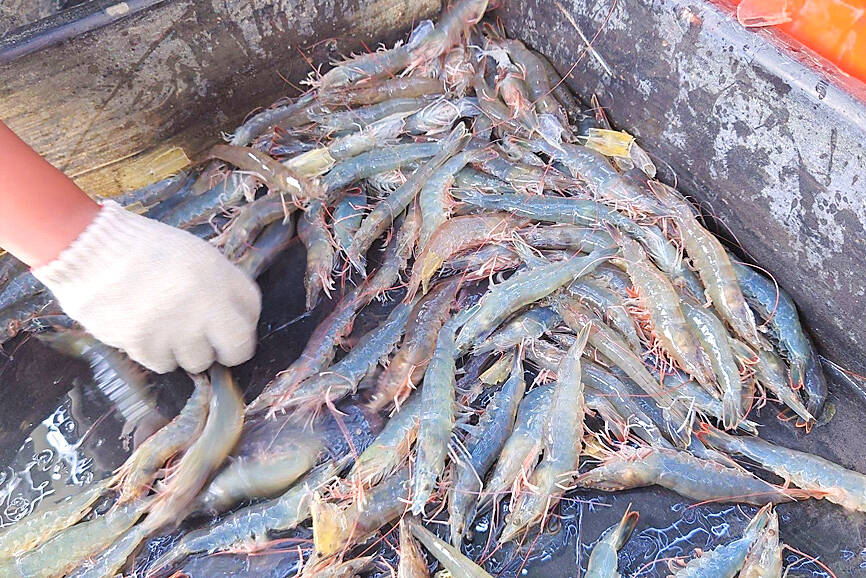Shrimp supply would not be affected if Honduras ends its diplomatic relations with Taiwan, as the nation has sufficient shrimp production to meet domestic demand, the Fisheries Agency said.
Taiwan imports 25,000 to 36,000 tonnes of whiteleg shrimp per year, 32 to 37 percent of which is from Honduras, Fisheries Agency Deputy Director-General Lin Kuo-ping (林國平) said.
Taiwan produces about 11,000 tonnes of whiteleg shrimp per year, which is sufficient to meet domestic demand, Lin said.

Photo: Yang Chin-cheng, Taipei Times
The export and import of whiteleg shrimp is a trade issue on which formal diplomatic ties have no bearing, he added.
Taiwan also imports whiteleg shrimp from Nicaragua, Panama and Thailand, he said.
Bilateral trade between Taiwan and Honduras has increased since the countries signed a free-trade agreement in 2007, Minister of Economic Affairs Wang Mei-hua (王美花) said on Wednesday.
Taiwan exports about US$60 million of goods to Honduras per year and imports US$120 million of goods from the Central American nation, she said.
Whiteleg shrimp and coffee are Honduras’ two largest exports to Taiwan, she added.
Separately, the agency said it would continue to diversify the export of fishery products, even as China reinstates Taiwanese imports of frozen largehead hairtail and frozen jack mackerel.
China in August last year banned Taiwanese imports of the products, alleging that that COVID-19 could spread from the packaging.
China on Wednesday announced that imports of largehead whitetail and jack mackerel would be immediately restored.
Taiwan in 2021 exported about 4,000 tonnes of frozen jack mackerel to other countries, agency data showed.
Before China imposed the import ban, about 4,000 tonnes of frozen jack mackerel were exported from January to July last year, 40 to 50 percent of which went to China, the agency said.
Between August and December last year, about 1,700 tonnes of jack mackerel were exported to Egypt, Mozambique, Thailand and seven other nations, the agency said.
Jack mackerel exports also reached about 900 tonnes from January to last month, it said.
About 9,000 tonnes of largehead hairtail were exported to other countries in 2021, 90 percent of which was exported to China, the agency said.
From August to December last year, about 300 tonnes of largehead hairtail was exported to Malaysia, Japan, South Korea and other nations.
Exports of largehead hairtails also reached about 500 tonnes during the first two months this year, the agency added.
“We have been using criteria consistent with international standards to inspect fishery products exported to other countries. We are glad that China has canceled the requirement to test for SARS-CoV-2 on fishery products, which is incongruent with international standards,” the agency said.
“We, along with the US, Australia and India, have expressed concerns at the WTO Sanitary and Phytosanitary Measures Committee over China’s practice, which is inconsistent with trade regulations and affects trade of agricultural products across the Taiwan Strait,” it said.
The agency implemented measures to help Taiwanese fishers and retailers when China imposed the import ban, including upgrading food processing and freezer storage facilities, offering incentives for fishery exports and keeping prices at production sites stable, it said.
“We have successfully expanded the sale of Taiwanese fishery products to markets in South Korea, Japan, Malaysia and the US,” the agency said. “We will continue to help fishers sell to more high-end markets.”

The brilliant blue waters, thick foliage and bucolic atmosphere on this seemingly idyllic archipelago deep in the Pacific Ocean belie the key role it now plays in a titanic geopolitical struggle. Palau is again on the front line as China, and the US and its allies prepare their forces in an intensifying contest for control over the Asia-Pacific region. The democratic nation of just 17,000 people hosts US-controlled airstrips and soon-to-be-completed radar installations that the US military describes as “critical” to monitoring vast swathes of water and airspace. It is also a key piece of the second island chain, a string of

A magnitude 5.9 earthquake that struck about 33km off the coast of Hualien City was the "main shock" in a series of quakes in the area, with aftershocks expected over the next three days, the Central Weather Administration (CWA) said yesterday. Prior to the magnitude 5.9 quake shaking most of Taiwan at 6:53pm yesterday, six other earthquakes stronger than a magnitude of 4, starting with a magnitude 5.5 quake at 6:09pm, occurred in the area. CWA Seismological Center Director Wu Chien-fu (吳健富) confirmed that the quakes were all part of the same series and that the magnitude 5.5 temblor was

Taiwan will now have four additional national holidays after the Legislative Yuan passed an amendment today, which also made Labor Day a national holiday for all sectors. The Chinese Nationalist Party (KMT) and Taiwan People’s Party (TPP) used their majority in the Legislative Yuan to pass the amendment to the Act on Implementing Memorial Days and State Holidays (紀念日及節日實施辦法), which the parties jointly proposed, in its third and final reading today. The legislature passed the bill to amend the act, which is currently enforced administratively, raising it to the legal level. The new legislation recognizes Confucius’ birthday on Sept. 28, the

The Central Weather Administration has issued a heat alert for southeastern Taiwan, warning of temperatures as high as 36°C today, while alerting some coastal areas of strong winds later in the day. Kaohsiung’s Neimen District (內門) and Pingtung County’s Neipu Township (內埔) are under an orange heat alert, which warns of temperatures as high as 36°C for three consecutive days, the CWA said, citing southwest winds. The heat would also extend to Tainan’s Nansi (楠西) and Yujing (玉井) districts, as well as Pingtung’s Gaoshu (高樹), Yanpu (鹽埔) and Majia (瑪家) townships, it said, forecasting highs of up to 36°C in those areas